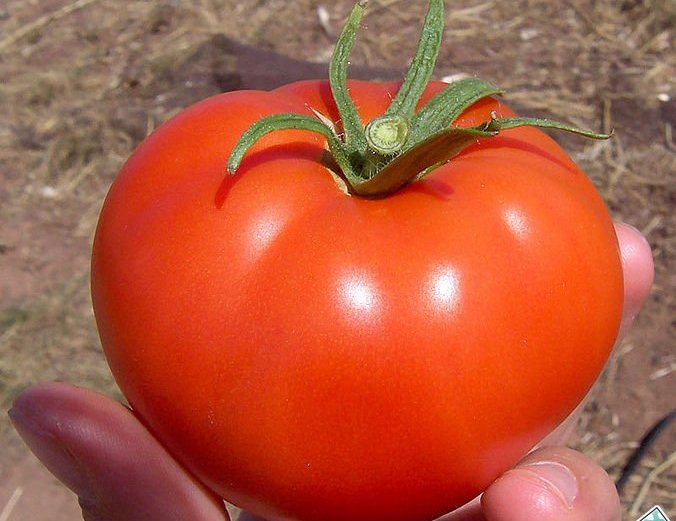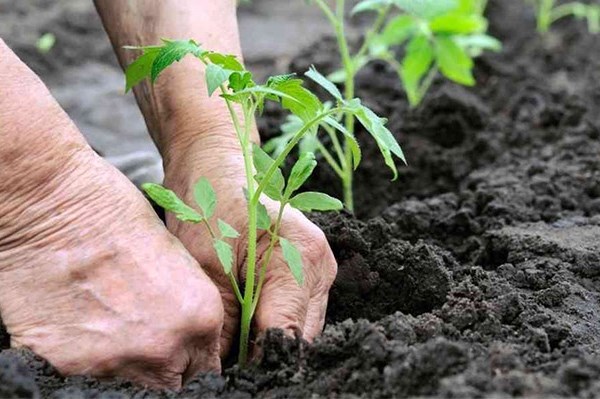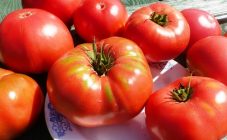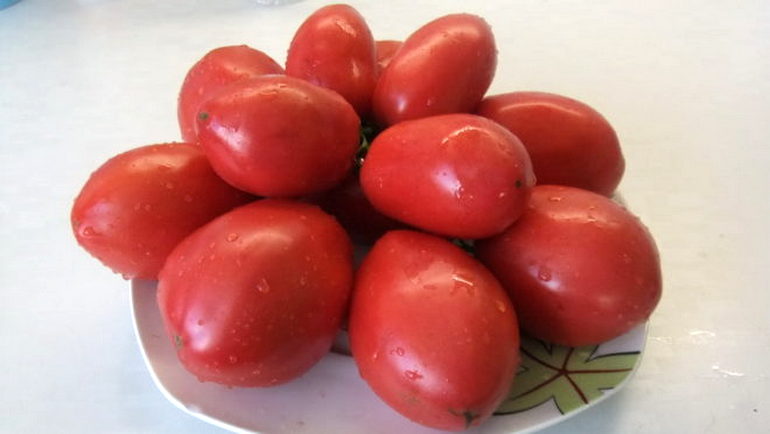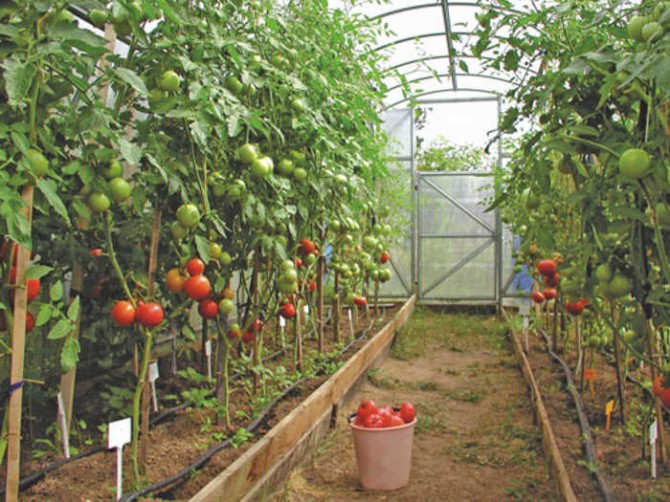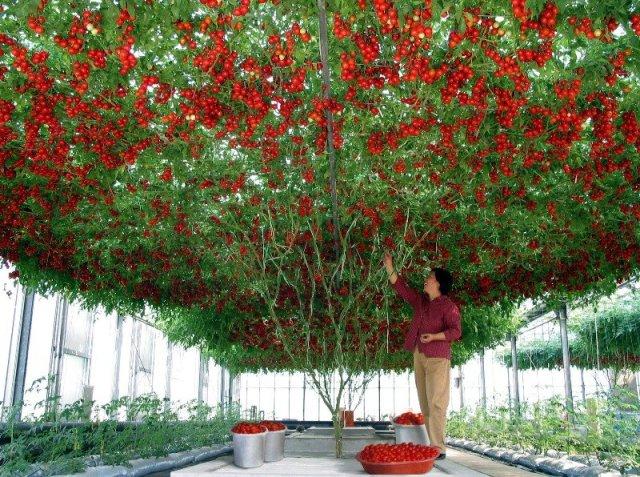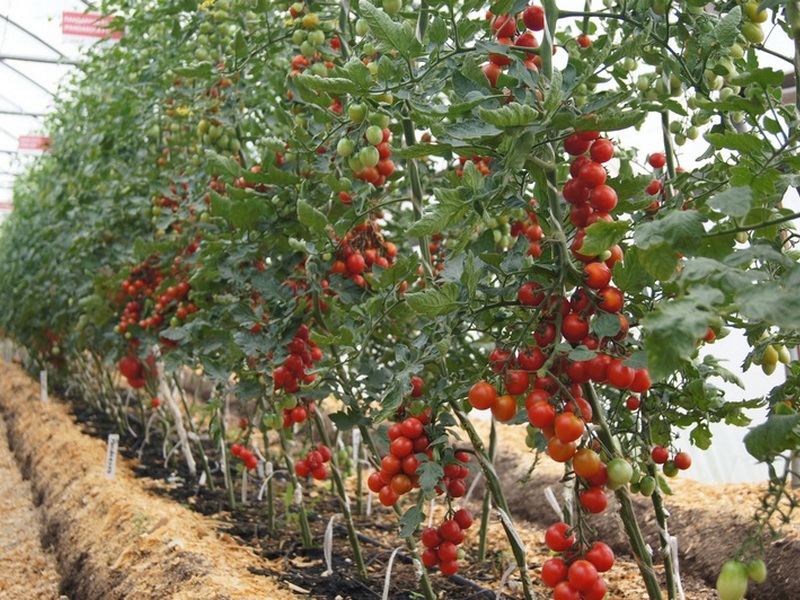Content:
As a rule, the majority of summer residents prefer to grow high-yielding varieties with medium ripening periods in their garden, such crops include Kolkhoznitsa tomatoes. A variety of tomatoes, with the right approach, will thank the owner with an excellent harvest, allow you to enjoy the juiciness of aromatic and tasty fruits.
History of the creation of culture
The Kolkhoznitsa tomato is very popular in the southern regions. The variety, known among amateur gardeners as the Collective Farm Woman, was bred by scientists from the Crimean Experimental Breeding Station. In the Urals, the European North, in central Russia, tomatoes are grown in greenhouse conditions, less often in open ground. The culture has taken root well in the Ukrainian and Moldovan lands.
Features of culture
When buying tomato seeds Kolkhoznitsa, remember the characteristics and description of the variety are important when choosing a crop.
Characteristics of the variety:
- medium early;
- flameproof;
- cold-resistant;
- high-yielding;
- well preserved and transported.
Tomato is also called the Kolkhoz Queen, and for good reason. It has many features. So, the culture is not very tall. It grows up to 60 centimeters, under favorable conditions, the growth reaches one meter. It is not a compact bush, it has dense green foliage.
Harvesting - 95-115 days after sowing the seeds. The fruits have a deep red color, dense flesh with a sweetish-sour taste.
Description of fruits:
- rounded shape;
- glossy surface;
- Red color;
- sweet and sour taste;
- pronounced aroma;
- does not crack;
- dense pulp;
- thick rind;
- the weight of one fruit is up to 100 grams (sometimes a little more);
- simultaneous maturation.
Tomato fruits are more suitable for conservation, drying and pickling. Housewives prepare delicious tomato juice, despite the thick peel, which not everyone likes, they eat tomatoes fresh.
Advantages and disadvantages
The presented tomato variety has more pros than cons. Therefore, it is so popular and in demand among gardeners who prefer to grow tomatoes in large plantations.
The benefits of culture:
- large yields;
- fruits are saturated with vitamins and useful trace elements;
- resistance to weather conditions;
- the variety is not picky about care;
- excellent long distance transportation without external damage;
- fruits do not crack;
- uniform ripening of fruits;
- disease resistance;
- growing by seedling and non-seedling methods.
Minuses:
- thick rind;
- pinching;
- bush formation.
The disadvantages of the culture are almost invisible against the background of all the advantages of the variety. If gardeners have long been accustomed to pinching and forming a bush, then not everyone likes the thick skin.When eaten fresh, the skin is peeled, this is the only way to fully enjoy the taste of aromatic tomatoes.
Growing technique
The Kolkhozny tomato variety is not picky about growing, it is resistant to pests and diseases. The main rule is adherence to the cultivation technique. The culture grows well on light, highly fertile soils.
Cultivation of culture in stages:
- seed preparation;
- growing seedlings;
- planting in the beds;
- seedling care.
Proper seed preparation is a guarantee of healthy seedlings. First of all, they choose good seeds, which are soaked for a couple of minutes in water and salt. Those seeds that have sunk to the bottom of the container with the solution are selected for planting. They are washed with plain water and disinfected.
So that the seedlings do not suffer from diseases, grow rapidly, and develop the root system, the seeds are soaked for half an hour in potassium permanganate, sometimes hydrogen peroxide is used. After that, the seed is treated with a growth stimulant.
The processed seeds are wrapped in cloth and immersed in half in water. Leave for 10 hours. During this time, the water is changed three times, the seed is shaken and aired from time to time.
The final stage of seed preparation is hardening. The process is necessary in order to improve yields and prepare the crop for negative weather conditions. Sprouted seeds are placed in a refrigerator for 12-14 hours, after which they are removed and heated for the same time. The temperature in the refrigerator should not exceed +2 degrees, and when the seeds are warmed up, at least +22 degrees.
Planting seedlings
The earth is poured into oblong containers, these can be wooden boxes, made by hand or purchased. Grooves are made in the ground, sprouted seeds are loosely spread, carefully covered with 0.5 centimeters of soil and easily tamped. After the work performed, moderate watering of the soil is carried out, the seedlings are covered with glass and carried for 5-6 days in a dark, but very warm room.
After the first shoots appear, the containers are transferred to a well-lit room, the glass is removed. When 2 leaves appear, the seedlings are transplanted into separate cups or peat pots. The transplant is carried out carefully, with a lump of earth, since the plants have a weak root system.
The seedlings are fertilized with diluted chicken droppings (1:15) or mullein (1:10). Fertilizers are applied three times. Before planting seedlings in open ground, they are hardened for a week.
Landing in the garden
Hardened plants at the age of 55-70 days are planted on the beds when the threat of late frosts has passed, approximately in the second half of May. Planting is carried out in areas well-lit by the sun, the soil is pre-dug up, fertilized with minerals and wood ash.
A productive variety is planted in the ground, observing the interval. The distance between plants is 70-90 centimeters, between the beds is 1 meter. After planting, the seedlings are well watered for better rooting and adaptation in the ground.
As the culture grows, a bush is formed into one stem. Despite its low growth, the bush is tied to a trellis.They also tie up the brushes so that they are not injured when large fruits are formed. To increase fruit formation, pinching is carried out. In order to avoid thickening of the planting, the lower foliage is cut off from the bushes to a height of 20 centimeters.
Good harvest rules:
- weeding;
- soil mulching;
- avoid overdrying the soil or waterlogging;
- bush formation;
- pinching, removing foliage from the bottom of the plant;
- prevention of diseases and pests.
You can enjoy delicious, aromatic fruits 100 days after planting seedlings. Growing Kolkhoz Tomatoes will not be difficult even for novice gardeners. The culture is unpretentious, and this has earned the love of many gardeners.
